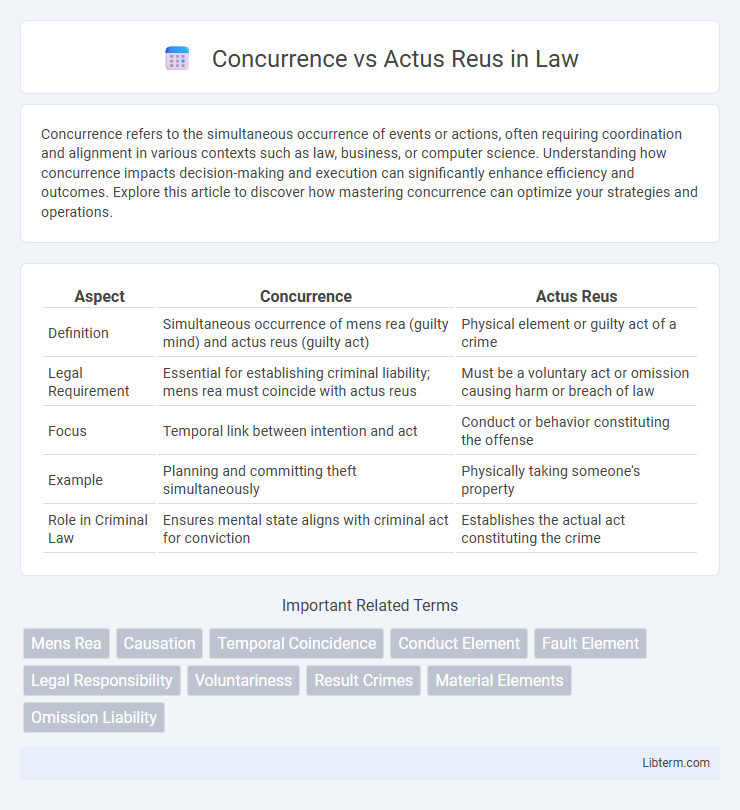Concurrence refers to the simultaneous occurrence of events or actions, often requiring coordination and alignment in various contexts such as law, business, or computer science. Understanding how concurrence impacts decision-making and execution can significantly enhance efficiency and outcomes. Explore this article to discover how mastering concurrence can optimize your strategies and operations.
Table of Comparison
| Aspect | Concurrence | Actus Reus |
|---|---|---|
| Definition | Simultaneous occurrence of mens rea (guilty mind) and actus reus (guilty act) | Physical element or guilty act of a crime |
| Legal Requirement | Essential for establishing criminal liability; mens rea must coincide with actus reus | Must be a voluntary act or omission causing harm or breach of law |
| Focus | Temporal link between intention and act | Conduct or behavior constituting the offense |
| Example | Planning and committing theft simultaneously | Physically taking someone's property |
| Role in Criminal Law | Ensures mental state aligns with criminal act for conviction | Establishes the actual act constituting the crime |
Understanding Concurrence and Actus Reus
Understanding concurrence and actus reus is essential in criminal law, where actus reus refers to the physical act or unlawful omission, and concurrence requires that this act occurs simultaneously with a guilty mind or mens rea. The principle of concurrence ensures that the defendant's criminal intention aligns with the commission of the criminal act, establishing a direct link between thought and action. Without this temporal connection, proving criminal liability becomes challenging, as both elements must coexist for a conviction.
Defining Actus Reus: The Physical Element
Actus reus refers to the physical element of a crime, encompassing the voluntary act or unlawful omission that leads to a criminal offense. It requires a clear, external manifestation of conduct that breaches a legal duty or prohibition, distinct from the mental state or mens rea. Understanding actus reus is crucial for establishing the factual basis of criminal liability before examining the concurrence with mens rea.
Concurrence: Linking Actus Reus and Mens Rea
Concurrence is a fundamental principle in criminal law requiring the simultaneous occurrence of actus reus (the guilty act) and mens rea (the guilty mind) for a crime to be established. This link ensures that the defendant's intentional state aligns precisely with the criminal conduct, preventing liability for unintended results or accidental actions. The doctrine of concurrence safeguards against disconnects where the timing between mental intent and physical act diverges, thus reinforcing culpability standards.
Legal Importance of Actus Reus
Actus reus constitutes the physical element of a crime, encompassing the voluntary act or omission that breaches legal duty. Its legal importance lies in establishing a tangible connection to criminal liability, ensuring that only actual conduct, not mere intention, leads to prosecution. Concurrence demands that the actus reus and mens rea coincide temporally, solidifying the foundation for criminal responsibility.
The Role of Concurrence in Criminal Liability
Concurrence requires that the mens rea (guilty mind) and actus reus (guilty act) occur simultaneously to establish criminal liability. The principle ensures that a defendant's intent aligns directly with the criminal act committed, preventing liability for harm caused without culpable intent. This alignment is pivotal in crimes such as homicide, where proving the temporal overlap of intent and action distinguishes criminal responsibility.
Key Differences: Concurrence vs Actus Reus
Concurrence requires the simultaneous occurrence of both the criminal intent (mens rea) and the actus reus (the physical act) for an offense to be established, emphasizing timing and alignment. Actus reus refers specifically to the external, physical element of a crime, such as a voluntary action, omission, or state of being, independent of intent. The key difference lies in concurrence mandating the coexistence of actus reus and mens rea, whereas actus reus alone describes only the conduct aspect without necessarily involving intent.
Common Misconceptions about Concurrence and Actus Reus
Concurrence requires that both the mens rea (guilty mind) and actus reus (guilty act) occur simultaneously for a crime to be established, but a common misconception is that the presence of either element alone suffices for criminal liability. Many mistakenly believe that if the defendant had the intent at any time, even without a corresponding wrongful act at that moment, concurrence is achieved, which is not the case under criminal law principles. The actus reus must coincide with the mens rea to prove a defendant's culpability, ensuring that the defendant's mental state aligns precisely with the criminal conduct committed.
Case Studies Illustrating Concurrence and Actus Reus
Case studies such as R v. Church (1966) highlight the principle of concurrence where the defendant's guilty act must coincide with the guilty intent, demonstrating that both actus reus and mens rea occur simultaneously. In Fagan v. Metropolitan Police Commissioner (1969), the court examined actus reus as a continuing act, showing how an accidental act can transition into a criminal act through mens rea developing during the incident. These landmark cases emphasize the legal necessity of linking physical conduct (actus reus) with a culpable state of mind (mens rea) to establish criminal liability.
Challenges in Proving Concurrence and Actus Reus
Proving concurrence between the mens rea and actus reus presents significant challenges because it requires establishing that the defendant's guilty mind coincided precisely with the criminal act. In many cases, evidence may only show the presence of intent or the act separately, making it difficult to link the two in time. Such difficulties often arise in crimes involving ongoing conduct or complex sequences of actions where the temporal alignment of mental state and physical act is not clear.
The Impact on Criminal Justice Proceedings
Concurrence requires that the defendant's guilty act (actus reus) and guilty mind (mens rea) occur simultaneously, influencing the establishment of criminal liability in court. Failure to prove this concurrency can lead to acquittal or reduced charges, affecting the outcome of criminal justice proceedings. Precise application of concurrence principles ensures accurate adjudication by linking intent directly to the criminal act, thereby upholding legal standards in prosecutions.
Concurrence Infographic

 libterm.com
libterm.com